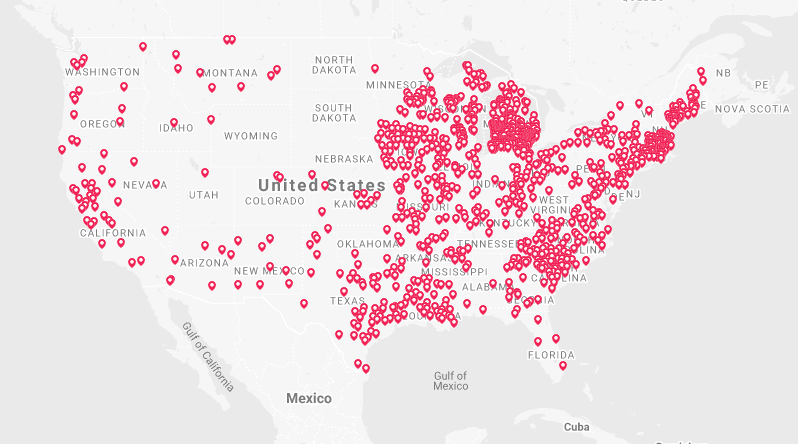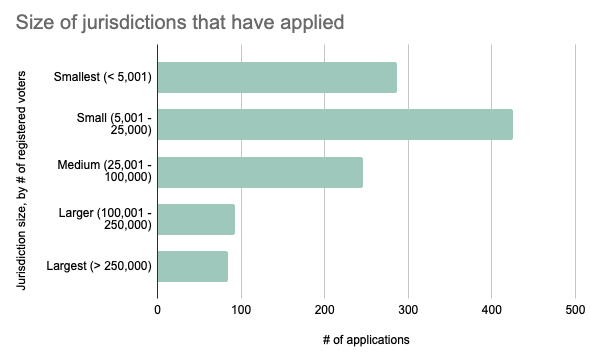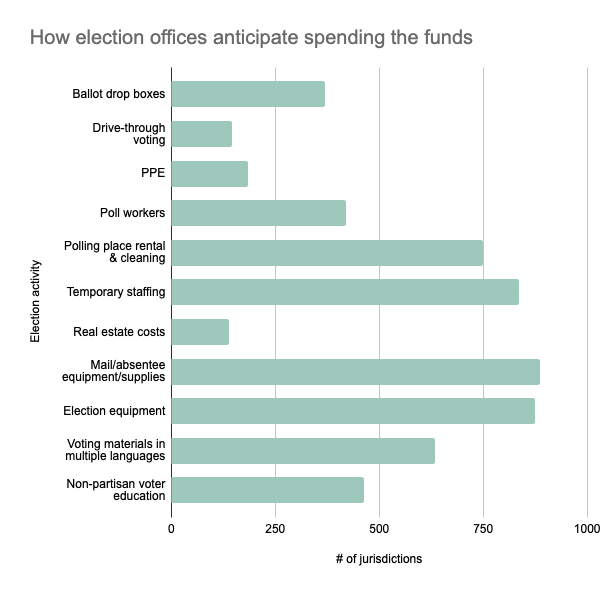CTCL Grant Program Receives Over 1,100 Applications and Counting
We recently launched our CTCL COVID-19 Response Grant Program to provide funding to U.S. local election offices to help ensure they have the critical resources they need to safely serve every voter in 2020. The grant program is an open call to every local election office in the country, and we’re thrilled to announce we’ve received over 1,100 applications (and counting!).
Election officials make democracy happen. Through our work at the Center for Tech and Civic Life, we are grateful to witness the incredible public service of our country’s election officials year round. This year we’ve seen election offices already move mountains to provide a safe, secure, and inclusive process for voters. They are offering drive-up voting, applying the latest public health guidelines to provide safe in-person voting options, and partnering with libraries to repurpose book drops into ballot dropboxes.
We also heard repeatedly about the desperate need for funding. We’ve heard this from countless election officials, from across the political spectrum, geographic boundaries, and jurisdiction sizes. The COVID-19 pandemic brings unprecedented challenges that most election budgets aren’t equipped to handle. As one of our grantee jurisdictions put it, “This will help fund the extra help we are in desperate need of.”
Which election offices receive funding?
The grants program is an open call to every local election office in the country, and the response has been outstanding so far. The pin-map below speaks to the sheer volume of applications we’ve received, as well as the geographic diversity. While we haven’t hit all 50 states yet, we’re so close!

In most states, elections are run at the county level. South Carolina has 46 counties, and an impressive 85% have applied for the grant. Iowa has 99 counties, and 60% have applied. States like Michigan, on the other hand, administer most election duties at the city and township levels. This explains why Michigan looks more heavily-dotted than South Carolina and Iowa, even though only ~20% of election offices in Michigan have applied for grants, compared to 85% and 60% in South Carolina and Iowa respectively.
Beyond geographic diversity, we’re seeing a wide range in jurisdiction size. As you can see in the chart below, the vast majority of applications are coming from jurisdictions with less than 25,000 registered voters.

Funding shortages hit low-budget offices hardest, and rural jurisdictions are often overlooked in the national landscape. That’s why the previous iteration of our grant program — before the $250 million contribution allowed us to scale up nationwide — included grants explicitly for rural jurisdictions. While we encourage every election office, large and small, to apply for these open-call grants, we especially love getting applications from particularly under-resourced election offices.
How are local election officials responding?
One of the most rewarding parts of the process has been hearing the excitement, energy, and gratitude from election officials after they receive funding. We’d like to share a few of our favorite messages:
“Thank you so much. We are a small rural township and this will be a huge help.”
“The pressure these funds take off the shoulders of the front line people trying to implement the law during this pandemic cannot be overemphasized.”
“Thank you so much!! This has been a challenging election season with budgets already set and many changes and unfunded mandates happening weekly. You are appreciated more than you know!!”
“May I just grab you and shout, THANK YOU THANK YOU THANK YOU?! We literally screamed when we opened this email notice from you. As you can imagine when we prepared our election budget for 2020, it could not anticipate the effects of COVID-19 hitting several months later and the changes to elections as a result. This money will go a LONG way in helping our office prepare best practices and service the voters.”
“I can’t tell you how much I appreciate receiving this grant money from you. We are a very small township, with very limited funds, and it will be meaningful. Protection of our election workers is so important! Plus, most of them are somewhat elderly, in a higher risk group.”
“Election officials have worked tirelessly this cycle. While we had the ability to work from home for a brief time, registering sensitive voter information made it impossible for very long. Some of us reported every single day. We love what we do and the public we serve so this is in no way a complaint. Still, to have this cushion at a time when it’s needed is fantastic. We plan to better educate our voters, better prepare and arm our team in their processes and store some of the additional equipment necessary safely and securely, just to name a few.”
What’s next?
Our job is to get funding into the hands of local election officials, then get out of their way. Election officials know what’s best for their communities and know exactly how to address budget shortfalls in this challenging election cycle. We leave spending decisions to the discretion of each grantee jurisdiction, as long as the election activity falls under these 4 broad categories:
- Ensure Safe, Efficient Election Day Administration
- Expand Voter Education & Outreach Efforts
- Launch Poll Worker Recruitment, Training & Safety Efforts
- Support Early In-Person Voting and Vote by Mail
We asked jurisdictions for a preview of how they intend to spend the money, and the following chart summarizes their responses. The most common expenses include polling place rental and cleaning, temporary staffing, mail/absentee equipment and supplies, and other election administration equipment.

We will continue connecting election offices with the funding they need, and promoting the opportunity to offices who haven’t yet applied. Our goal is to provide funding to every election office that wants it — large and small, in all 50 states.
Have questions about implementing public health measures, scaling absentee ballot processing, or educating voters? Visit CTCL’s new Election Resources for Safe Elections website, a collection of free and easy to use resources devoted to helping you navigate today’s election challenges.